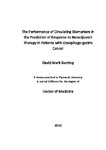The Performance of Circulating Biomarkers in the Prediction of Response to Neoadjuvant Therapy in Patients with Oesophago-gastric Cancer
| dc.contributor.supervisor | Jankowski, Janusz | |
| dc.contributor.author | Bunting, David Mark | |
| dc.contributor.other | Faculty of Health | en_US |
| dc.date.accessioned | 2016-10-18T10:22:03Z | |
| dc.date.available | 2016-10-18T10:22:03Z | |
| dc.date.issued | 2016 | |
| dc.identifier | 10401963 | en_US |
| dc.identifier.uri | http://hdl.handle.net/10026.1/6565 | |
| dc.description.abstract |
Introduction The prognosis in oesophago-gastric cancer is poor with less than 15% patients surviving beyond 5 years after diagnosis. The addition of neoadjuvant therapy has been shown to increase survival in patients suitable for curative surgery. However, the additional gains are modest and the majority of patients do not respond sufficiently from therapy to gain any benefit. There is an urgent need to identify markers that can predict response to neoadjuvant therapy in order provide safer, more effective, individualised treatment regimes. Methods A prospective, multi-centre, collaborative study was undertaken in patients with oesophago-gastric cancer undergoing neoadjuvant therapy and potentially curative surgery. Levels of circulating biomarkers M2-Pyruvate kinase, alkaline phosphatase, CA19-9, CEA and CA 72-4 were measured in patients before and after administering the first cycle of chemotherapy. Binary logistic regression analysis was performed to assess the ability of biomarkers to predict histological response to therapy. Results 165 patients were recruited to the main study. 105 patients had complete histopathological data for analysis. There were 27 responders and 78 non-responders to neoadjuvant therapy. There were no differences in pre-therapy demographic, pathological or treatment factors between the two groups. Responders had less post-operative lymphovascular invasion (P= 0.004) and higher R0 resection rates (P=0.03). Pre-therapy M2-Pyruvate kinase levels were lower in responders compared to non-responders (P=0.037) and levels were able to predict response with each unit increase in the biomarker level being associated with a 4.1% decrease in the likelihood of response (P=0.027). M2-PK levels were not associated with any pre-operative demographic, clinical or pathological factors. Conclusions Pre-therapy dimeric M2-PK levels can predict response to neoadjuvant therapy in patients with oesophago-gastric cancer. The test could be of clinical value for 1 in every 8 patients undergoing the test. | en_US |
| dc.description.sponsorship | Plymouth Hospitals NHS Trust | en_US |
| dc.language.iso | en | |
| dc.publisher | University of Plymouth | |
| dc.subject | Cancer | |
| dc.subject | Gastric cancer | |
| dc.subject | Chemotherapy | |
| dc.subject | Chemoradiotherapy | |
| dc.subject | Biomarker | |
| dc.subject | Oesophageal cancer | en_US |
| dc.subject.classification | Other (e.g., MD, EdD, DBA, DClinPsy) | en_US |
| dc.title | The Performance of Circulating Biomarkers in the Prediction of Response to Neoadjuvant Therapy in Patients with Oesophago-gastric Cancer | en_US |
| dc.type | Thesis | |
| plymouth.version | publishable | en_US |
| dc.identifier.doi | http://dx.doi.org/10.24382/492 | |
| dc.rights.embargoperiod | No embargo | en_US |
| dc.type.qualification | Doctorate | en_US |
| rioxxterms.funder | Not available | en_US |
| rioxxterms.identifier.project | Not available | en_US |
| rioxxterms.version | NA |
Files in this item
This item appears in the following Collection(s)
-
01 Research Theses Main Collection
Research Theses Main


